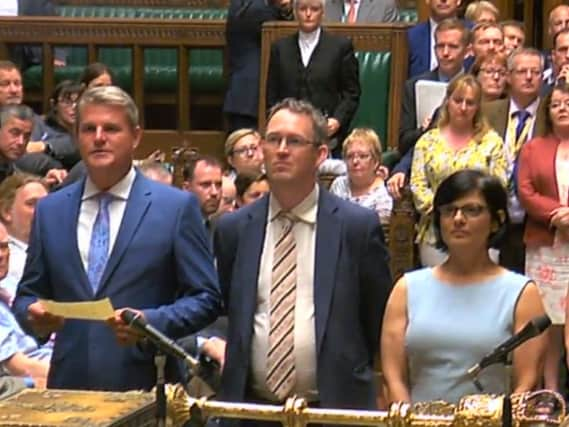Theresa May narrowly escapes defeat after caving in to Brexiteers


Downing Street has insisted its Brexit strategy is still alive after the Prime Minister was forced change to crucial trade legislation under pressure from Eurosceptic Conservative MPs.
The government accepted all four amendments to the Customs Bill to avoid the certainty of an embarrassing rebellion at the hands of Jacob Rees-Mogg and fellow Brexiteers.
Advertisement
Hide AdAdvertisement
Hide AdBut in dramatic scenes in the Commons, the government then narrowly avoided a humiliating defeat when a number of pro-EU Tories refused to go along with the decision. A crucial vote on the collection of customs duties passed by 305 to 302, a majority of just three.
It was confirmed the government will seek to bring forward the Commons summer recess by five days to Thursday, limiting the time available for Tory MPs to try force a vote of no confidence in the Prime Minister.
Eurosceptics have rallied support against the Mrs May’s plan agreed at Chequers as they build up their campaign against plans to retain EU regulations on goods and agriculture.
A Brexiteer source was quoted saying the move confirmed that “Chequers is dead on arrival” after the government caved in.
Tory Remainer Anna Soubry suggested Mr Rees-Mogg was now “running Britain”, while Labour MP Stephen Kinnock accused the Prime Minister of “dancing to the tune” of the European Research Group of Tory Brexiteers.
But Mrs May insisted the amendments do not change the blueprint agreed at her country residence.
She told MPs: “I would not have gone through all the work that I did to ensure that we reached that agreement only to see it changed in some way through these bills.”
Downing Street insisted the amendments it had accepted were still consistent with the plans in the Chequers agreement but the move may limit the government’s room for manoeuvre in exit talks with the EU.
Advertisement
Hide AdAdvertisement
Hide AdSNP deputy Westminster leader Kirsty Blackman said the Prime Minister had given in to her party’s hard Brexit faction.
“The Tory government is riding roughshod over the Scottish Parliament’s voice on Brexit. This is the next stage of the Tory power grab – and people now see the damage that will do.”
The Liberal Democrat Brexit spokesman Tom Brake MP claimed that “at one of the most critical junctures in our political history, the Tory government is languishing in a state of civil war”.
Brexiteers believe their amendments will make the Prime Minister’s plan unacceptable to the EU, which insists that the “backstop” proposal to avoid a hard border in Ireland remains available.
One of the rebel amendments demanded that the UK should scrap an offer to collect taxes and duties on behalf of the EU unless it pledges to do the same for Britain.
A second forces the government to commit in law not to allow a customs border down the Irish Sea, which could come into conflict with the backstop’s demand that Northern Ireland remains aligned with the Republic for customs purposes.
In his first Commons speech since resigning from the government, the former Brexit secretary David Davis said the government would never allow a hard border. He told MPs that the issue “has got much more difficult since becoming politicised” but was “eminently soluble”.
Last night the SDLP accused the government of allowing Brexiteers to “destroy the backstop and subsequently destroy the socio-economic and political future” of Ireland.
Meanwhile, the parliamentary private secretary at the Treasury, the North Cornwall MP Scott Mann, announced he was resigning yesterday in protest at what he called a “watered-down Brexit”.
